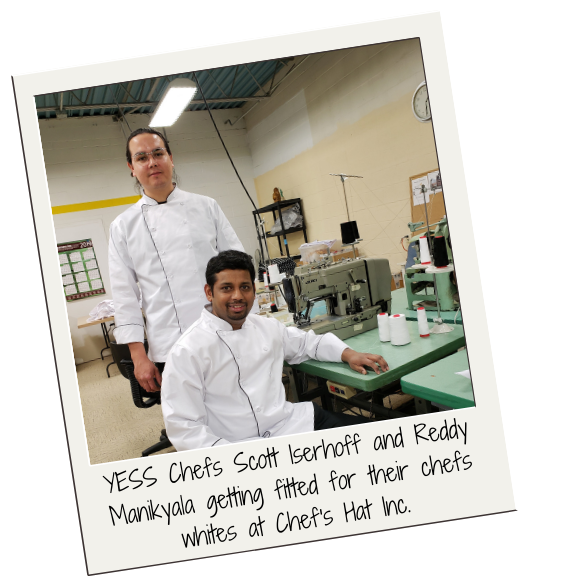At YESS our vision is to walk beside traumatized youth on their journeys towards healing and appropriate community integration. This doesn’t just apply to youth workers in Programs—it applies to every department across YESS! And just like many other folks would say about their own homes, what happens in the kitchen is a huge part of the heart of our work at YESS.
We sat down with YESS Chef Scott Iserhoff to talk about his experiences in creating a space where youth can heal through his culinary calling. Scott studied culinary arts and hotel management in Ontario and has been a chef for over 15 years. But his love of food and community goes back farther than that.
“Cooking is an integral part of my Indigenous culture. My first exposure to food was through eating wild meat with my family and smoking goose over the fire with my grandparents,” says Scott.
How does Scott bring this same powerful feeling he first experienced in childhood to his work at YESS?
“In my culture we say that food is medicine,” says Scott. “Not only does it feed your body, but it also carries a strong sense of community and hard work. Preparing food for others can also be seen as ceremony. It feeds your spirit.”
Almost half of the youth who access YESS identify as Indigenous and Scott takes every opportunity he can to share culture and connection with all our youth.
“Being an Indigenous person and being present in the space of YESS contributes to many youth who are also Indigenous feeling more represented, safer, and having someone to relate to,” says Scott. “This also extends to cooking, where I have the chance to share my cultural dishes with the youth, providing many of them with comfort and connection through food.”
Last year we announced that our focus would move more towards trauma-informed care. This has started to reach out from youth programs to touch other areas of YESS to align all teams with what it means to walk beside youth on their journeys towards healing. This includes the kitchen in a major way.
“Food is one of the top resources we need to secure for our kids in trauma care and if we cannot reassure our kids that they will always have food, we will never get to the root of their trauma,” says Cherish Hepas, Kitchen Supervisor. “In a small way we add to a positive experience for our youth on a daily basis through food. It has been a joy to watch them literally eat their hearts out. Trauma-informed care will be a fantastic tool to help our kids. It’s going to be an exciting time for the agency as we embark on this new form of care.”
In his two years at YESS, Scott has impacted hundreds of young lives through food and culture, making YESS a safe and healing space for youth who have experienced trauma. What has Scott taken away from the time he has spent with youth?
“The most remarkable experiences for me are connecting with youth over food and hearing about what they’ve enjoyed or what food they’d like to try in the future,” says Scott. “I wish that more people were aware of homelessness in our city and the huge gaps in resources that still exist, as well as the prejudice and stigma that our youth have to face on a daily basis. With more awareness hopefully there will be more understanding and positive change.”
The special way that YESS chefs Scott, Reddy, and Cherish honour their work in the kitchen shows in the ways our youth experience food, build trust, and heal through relationships.
“This kitchen was given to me as a gift from my predecessor. I treat it like a very special gift. I teach my staff to treat it like a gift,” says Cherish, “That is what walking beside our youth is like. It’s a window into their souls. If this kitchen can somehow touch one of those beautiful souls through food, we will have added a little light in whatever darkness they battle. And that is what food is in the end. Something that truly nourishes.”


Post a comment